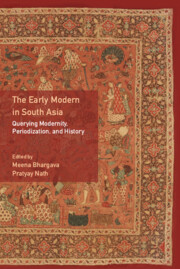3 - Beginnings of Modernity in South Asia: Natural Philosophy in Persianate Islam
Published online by Cambridge University Press: 06 September 2022
Summary
Will believers actually see the Almighty on the Day of Judgement? Could there be multiple worlds? What is the relationship between matter and space, and could there be a void? How does matter evolve and become increasingly differentiated? These inherently modern questions were the subject of heated debate in late-nineteenth-century India, and they continue to draw an array of responses even today. But what if these same questions were seeded around the year 1000 CE, long before they came into bloom in the mid-seventeenth century? One consequence of that would be to make us ponder the temporal boundaries of what defines the modern. In this chapter, I explore the trajectory of a particular intellectual tradition that began prior to and continued through the nineteenth century – a time that is often periodized as the beginning of modernity in this region. In questioning the dative nomenclature of the medieval or Middle Ages of South Asian history, I also question the narrative of an imported and ruptured modernity thrust upon a people without agency.
Much is at stake, for historiography is concerned with more than nomenclature; indeed, it is an adjustment of the lenses through which history is interpreted. Modernity in this part of the world has been defined in terms of colonialism and the reformulation of knowledge in the light of European ideas. It has traditionally been seen to flow from west to east as the product of intellectual enlightenment and technological advancement. But there is a growing sense that India engendered a modernity of its own even before the advent of colonialism. As discussed in this chapter, the circulation of ideas within the Persianate region in general, and between India and Iran in particular, during the few centuries preceding the advent of British colonialism is indicative of a dynamic intellectual environment where powerful and innovative possibilities developed apart from European influence. Defining the period from the sixteenth through the eighteenth centuries as ‘early modern’, rather than ‘late medieval’ or the ‘Mughal era’, affirms such agency of India as a region and pushes historians to examine this period in terms of a complex interplay of local, regional, and global actors.
- Type
- Chapter
- Information
- The Early Modern in South AsiaQuerying Modernity, Periodization, and History, pp. 64 - 82Publisher: Cambridge University PressPrint publication year: 2023



